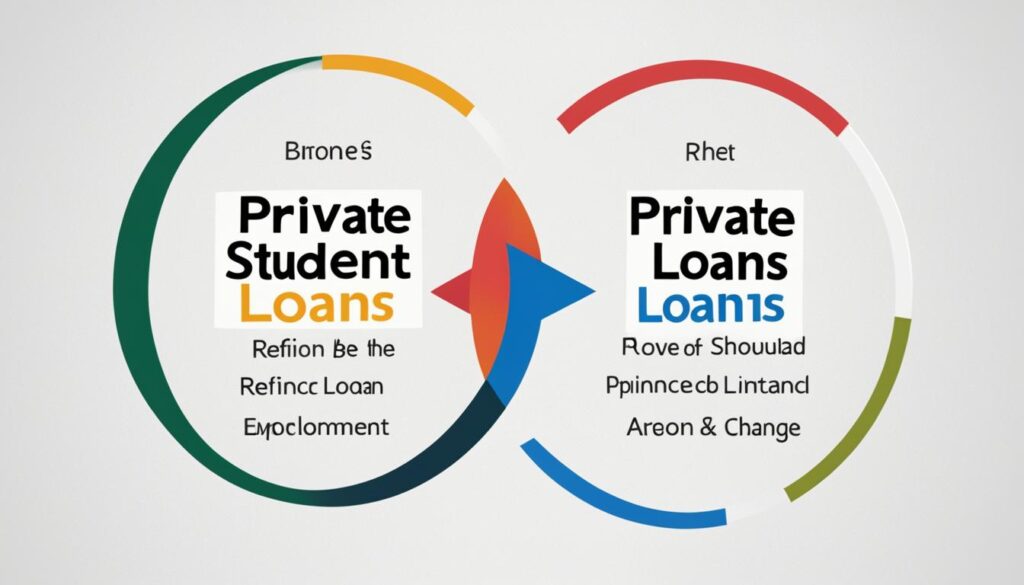Student Loan Forgiveness For Private Loans is a topic of great interest for many individuals burdened with private student loans. Unlike federal student loans, forgiveness programs for private student loans are rare. Generally, private lenders do not offer forgiveness programs, making loan repayment a challenge for student loan borrowers.
While private lenders may not offer forgiveness programs, there are strategies and options available to help manage private student loan debt. These include exploring repayment assistance programs, contacting your private lender for potential assistance, and considering loan refinancing to potentially lower interest rates.
Key Takeaways:
- Private student loan forgiveness is generally rare.
- Private lenders do not typically offer forgiveness programs.
- Exploring repayment assistance programs can help manage private student loan debt.
- Contacting private lenders may provide options for assistance.
- Loan refinancing can potentially lower interest rates on private student loans.
Strategies for Repaying Private Student Loans
If you’re struggling to repay your private student loans, there are several strategies you can consider. These include:
- Contacting your lender to explore repayment options. It’s important to communicate with your lender to discuss potential solutions that can help make your student loan payments more manageable.
- Refinancing your loans to potentially get a lower interest rate. By refinancing your private student loans, you may have the opportunity to secure a lower interest rate, which can save you money over time. It’s worth researching different lenders to compare rates and terms.
- Exploring private student loan repayment assistance programs. Some private lenders offer repayment assistance programs that can provide options for reduced payments, extended repayment terms, or other forms of assistance. Reach out to your lender to determine if any programs are available to you.
To further tackle your private student loan debt, it’s also worth considering optimizing your federal loans and exploring alternative income sources. By optimizing your federal loans, such as through income-driven repayment plans, you can potentially lower your monthly payments and allocate more funds towards your private student loan payment. Additionally, exploring alternative income sources can help you generate extra money to put towards your student loan repayment.
“By exploring these strategies, you can take proactive steps towards managing your private student loan debt while ensuring you stay on track with your repayment obligations.” – Financial Expert
Contacting Your Lender for Assistance

If you’re facing challenges with making payments on your private student loans, it is crucial to reach out to your lender. While private lenders may not typically offer forgiveness programs, they often have other options available to assist borrowers like you who are struggling with repayments. By contacting your lender, you can explore these options and find a solution that suits your financial situation.
Private lenders understand that unforeseen circumstances or financial hardships may affect your ability to make timely payments. Therefore, they may be willing to work with you to find a feasible solution, such as deferment or forbearance programs. These options can temporarily postpone your loan payments, providing you with some relief during difficult times. However, it’s important to note that interest may still accrue during these periods.
Deferment programs allow you to temporarily pause your loan payments due to specific circumstances, such as unemployment, military deployment, or returning to school. During deferment, interest may or may not continue to accrue, depending on your loan terms and lender policies. This can provide a short-term break from payments while you work towards stabilizing your financial situation.
Forbearance, on the other hand, is an option that allows you to temporarily reduce or pause your loan payments due to financial difficulties. Unlike deferment, interest will continue to accrue during this period, potentially increasing the overall cost of your loan. Therefore, it’s important to carefully consider the impact of choosing forbearance on your long-term financial goals.
By discussing your financial situation and exploring these options with your private lender, you can find relief and prevent defaulting on your loan. Defaulting can have severe consequences, including damaged credit and legal action from the lender. Open communication with your lender is essential to seeking assistance and avoiding the negative ramifications of default.
“Contacting your lender is the first step towards finding a solution for your private student loan repayment difficulties. By exploring available options such as deferment or forbearance, you can alleviate temporary financial strain and work towards a more manageable repayment plan.”
Refinancing Your Student Loan Forgiveness For Private Loans

Refinancing your private student loans can be a smart strategy to consider. When you refinance, you have the opportunity to secure a lower interest rate, potentially saving you a significant amount of money over the life of the loan.
By refinancing, you can simplify your repayment process by combining multiple loans into a single loan with one monthly payment. This can make it easier to manage your finances and stay on top of your repayment obligations.
When refinancing your private student loans, it’s crucial to research and compare different lenders to find the best terms and repayment options that align with your financial situation. Look for competitive interest rates, flexible repayment terms, and any additional benefits or perks that may be offered.
Why Consider Refinancing?
There are several benefits to refinancing your private student loans:
- Potential cost savings: By securing a lower interest rate through refinancing, you may be able to save money over the life of the loan.
- Simplified repayment: Consolidating your loans into one can simplify your repayment process, making it easier to manage your finances.
- Improved flexibility: Some lenders offer flexible repayment options, such as adjustable monthly payments or the ability to choose between fixed and variable interest rates.
Things to Consider
While refinancing your private student loans can be beneficial, it’s essential to consider the following:
“Refinancing your federal student loans into private loans may result in losing certain federal benefits.”
If you refinance federal loans into private loans, you may lose access to federal benefits such as income-driven repayment plans, loan forgiveness programs, and deferment or forbearance options. Before refinancing, carefully review the terms and benefits of your federal loans to determine if it’s the right choice for you.
Additionally, it’s important to note that refinancing eligibility and terms vary among lenders. Some lenders may require a minimum credit score or a certain income level to qualify for refinancing. Be sure to check the eligibility requirements of different lenders to find the best fit for your financial situation.
Overall, refinancing your private student loans can provide financial relief by reducing your interest rate and simplifying your repayment process. However, it’s crucial to consider all aspects, weigh the pros and cons, and compare different lenders before making a decision.
Exploring Private Student Loan Repayment Assistance Programs

Many private lenders offer repayment assistance programs to help borrowers manage their student loan debt. These programs can vary depending on the lender and may include options for reduced payments, extended repayment terms, or other forms of assistance. It’s important to reach out to your lender to determine what programs may be available to you.
Private student loan repayment assistance programs can provide valuable support in navigating the challenges of student loan debt. These programs aim to ease the burden of repayment and help borrowers stay on track with their financial goals. By offering various options and benefits, private lenders recognize the importance of supporting their borrowers throughout their repayment journey.
Reduced Payments and Extended Repayment Terms
One common feature of private student loan repayment assistance programs is the availability of reduced payment options. These programs may offer borrowers the ability to temporarily lower their monthly payments based on their financial circumstances. This can provide much-needed relief during difficult times and allow borrowers to stay current on their loan payments without undue financial strain.
In addition to reduced payments, private lenders may also offer extended repayment terms. This means borrowers can extend the length of their loan repayment period, reducing the monthly payment amount. While this may result in paying more interest over time, it can provide immediate relief for individuals facing financial difficulties and struggling to meet their current payment obligations.
Financial Hardship Assistance and Forbearance
Private student loan repayment assistance programs may also include options for borrowers facing temporary financial hardships. These programs may offer temporary forbearance or deferment, allowing borrowers to temporarily pause or reduce their loan payments during challenging times. Forbearance and deferment can provide a vital safety net for individuals facing unexpected financial difficulties, such as job loss or medical emergencies.
Private student loan repayment assistance programs can be a lifeline for borrowers facing financial challenges. It’s important to explore the options available to you and communicate with your lender to find a solution that works for your unique situation.
Additional Benefits and Resources
Beyond the direct financial assistance, private lenders may also provide additional benefits and resources to support borrowers. These can include educational resources on managing personal finances, financial counseling services, and tools for budgeting and loan management. By offering these resources, lenders aim to empower borrowers with the knowledge and skills necessary to navigate their student loan repayment journey successfully.
Exploring private student loan repayment assistance programs can be a proactive step towards managing your student loan debt effectively. By understanding the options available to you, you can make informed decisions and take advantage of the support offered by private lenders.
Private Student Loan Repayment Assistance Programs Comparison
| Lender | Reduced Payments | Extended Repayment Terms | Financial Hardship Assistance | Additional Resources |
|---|---|---|---|---|
| Lender A | ✓ | ✓ | ✓ | ✓ |
| Lender B | ✓ | ✓ | ✓ | ✓ |
| Lender C | ✓ | ✓ | – | ✓ |
| Lender D | ✓ | – | ✓ | – |
Note: The table above provides a generalized comparison of some private lenders’ student loan repayment assistance programs. It is important to consult with individual lenders to verify the specific details and eligibility requirements of their programs.
Optimizing Federal Loans for Debt Repayment

While private loan forgiveness options are limited, it’s crucial to explore opportunities for optimizing your federal loans to effectively manage your overall student debt. By taking advantage of federal student loan repayment options, you can potentially reduce your monthly payments, freeing up more funds to tackle your private student loan debt.
One of the strategies you can consider is an income-driven repayment plan. These plans adjust your monthly payments based on your income and family size, making them more affordable and manageable. By capping your monthly payment at a percentage of your discretionary income, you can ensure that your federal loan repayment is more aligned with your current financial situation.
There are several types of income-driven repayment plans available:
- Income-Based Repayment (IBR)
- Pay As You Earn (PAYE)
- Revised Pay As You Earn (REPAYE)
- Income-Contingent Repayment (ICR)
Each plan has its own eligibility criteria and requirements, so it’s essential to research and compare the options to determine which one suits your needs best.
Additionally, if you make consistent payments under an income-driven repayment plan for a specific period of time, you may qualify for loan forgiveness. The forgiveness options available may vary depending on whether you have federal or private loans. However, federal student loan borrowers may be eligible for forgiveness after 20 to 25 years of qualifying payments, depending on the repayment plan chosen.
| Repayment Plan | Forgiveness Period |
|---|---|
| Income-Based Repayment (IBR) | 20 or 25 years, depending on loan disbursement date |
| Pay As You Earn (PAYE) | 20 years |
| Revised Pay As You Earn (REPAYE) | 20 or 25 years, depending on loan type |
| Income-Contingent Repayment (ICR) | 25 years |
It’s important to note that federal student loan forgiveness is generally not available for private student loans. However, by optimizing your federal loan repayment, you can free up resources to prioritize paying down your private student loan debt and potentially expedite the repayment process.
Keep in mind that while focusing on your federal loans, you should continue making timely payments towards your private loans to avoid default and negative impact on your credit score.
In the next section, we’ll explore the possibilities of employer assistance programs and their potential impact on managing your private student loan debt.
Employer Assistance Programs

Some employers offer student loan assistance as part of their benefits package. This can provide valuable support for employees managing their private student loan debt. Employer assistance programs may include:
- Student Loan Repayment Assistance: Employers may offer financial contributions towards your student loan payments.
- Loan Forgiveness Options: Some employers provide loan forgiveness programs, where a portion of your student loan debt is forgiven after a certain period of employment.
If you’re job hunting or considering a career change, researching employers who offer these programs could be beneficial. Not only can employer assistance programs provide assistance with student loan repayment, but they can also enhance your overall job satisfaction and financial stability.
Case Study: XYZ Corporation
“At XYZ Corporation, we understand the burden of student loan debt. That’s why we offer our employees a comprehensive student loan assistance program. Through our program, eligible employees can receive monthly contributions towards their student loan payments. We believe that by supporting our employees in managing their student loan debt, we can help them thrive both personally and professionally.”
Employer assistance programs can significantly alleviate the financial stress associated with private student loan repayment. Make sure to explore the benefits package of prospective employers and consider the impact of employer assistance programs when making career decisions.
| Benefits of Employer Assistance Programs | Challenges of Employer Assistance Programs |
|---|---|
|
|
The Possibility of Discharging Private Student Loans in Bankruptcy

Discharging private student loans in bankruptcy is challenging but not impossible. While federal and private student loans can be discharged in bankruptcy under specific circumstances, it’s important to consult an experienced bankruptcy attorney to understand the complex process and determine if you qualify for an undue hardship discharge.
Understanding the Challenges
Unlike federal student loans, private student loans are generally not eligible for discharge in bankruptcy. Private student loans are considered non-dischargeable debts, meaning that they cannot be easily wiped out through bankruptcy proceedings.
However, there is a possibility of discharging private student loans if you can prove undue hardship. To do so, you’ll need to demonstrate that repaying your student loans would cause you significant financial distress and that you have made good faith efforts to repay the loans.
Consulting an Experienced Attorney
Consulting with an experienced bankruptcy attorney is crucial when considering the possibility of discharging private student loans. They can help you navigate the complex legal requirements and determine if you have a strong case for an undue hardship discharge.
Bankruptcy laws can vary depending on your jurisdiction, and an attorney will be familiar with the specific rules and regulations in your area. They can assess your financial situation, review your loan agreements, and provide guidance on the best course of action.
Keep in mind that bankruptcy should be a last resort and should only be considered after exploring other options for managing your private student loan debt.
Exploring Alternatives
Before considering bankruptcy, it’s important to explore other alternatives for managing your private student loans. These may include:
- Loan consolidation or refinancing: Consolidating your loans or refinancing them can help you secure a lower interest rate or more manageable repayment terms.
- Income-driven repayment plans: If you have federal student loans, you may be eligible for income-driven repayment plans that cap your monthly payments based on your income.
- Negotiating with lenders: Reach out to your lender to discuss potential repayment options, such as reduced interest rates, extended repayment periods, or temporary deferments.
By exploring these alternatives and working with your lender, you may be able to find a solution that allows you to repay your private student loans without resorting to bankruptcy.
Understanding the intricacies of private student loans is crucial, as private lenders may have specific terms and conditions that differ from federal loans. While various relief options and forgiveness programs exist, they may not universally apply to private student loans. Discharging private student loans is a complex process, and borrowers need to be aware that certain programs, like the Public Service Loan Forgiveness Program, are designed for federal loans and may not extend to private ones.
Despite the fact that private student loan forgiveness programs aren’t as prevalent, there are alternatives to explore, such as refinancing your private student loans, which could potentially offer relief and help you tackle your student loan balance more effectively. It’s important to note that defaulting on your student loan, whether federal or private, can have serious consequences, emphasizing the need to explore options for federal student loans and weigh them against the unique aspects of private student loans.
Additionally, private student loan lenders may offer specific benefits, and borrowers should know about private student loan refinancing calculators to assess potential savings. In navigating the student loan market, borrowers should consider all available relief options, from loan discharge to teacher loan forgiveness, and be informed about alternatives to private student loans, such as direct consolidation loans or seeking student loan relief through state programs. Ultimately, whether paying off your student loans through bankruptcy or pursuing forgiveness, a comprehensive understanding of the distinct aspects of private student loans is essential for making well-informed financial decisions.
Also Read : Smart Money Moves: Discover The Power Of A Chase Personal Loan Today!
Conclusion
Private student loan forgiveness is generally rare, but there are strategies you can utilize to manage your debt. Contacting your lender, exploring repayment assistance programs, refinancing your loans, and optimizing your federal loans are all viable options. Additionally, considering employer assistance programs and exploring the possibility of loan discharge in bankruptcy can provide alternative routes for relief.
It’s essential to carefully assess your situation, review your loan agreements, and seek professional guidance to determine the best approach for your specific circumstances. Managing private student loan debt requires proactive measures and informed decision-making. By staying informed and exploring the available options, you can take control of your financial situation and work towards achieving your goals.
Remember, each individual’s situation is unique, and what works for one person may not work for another. Finding the best solution for your private student loan debt may require a combination of these strategies or other personalized approaches. Take the time to evaluate your options, reach out to experts in the field, and develop a plan that fits your needs and long-term financial objectives.
FAQs
Q: What is private student loan forgiveness?
A: Private student loan forgiveness refers to the cancellation or discharge of private student loan debt, allowing borrowers to no longer be obligated to repay the amount borrowed.
Q: Do relief options for private student loans exist?
A: Yes, there are relief options for private student loan borrowers, such as refinancing, income-driven repayment plans, and forbearance or deferment options.
Q: Are there alternatives to private student loan forgiveness?
A: Yes, alternatives to private student loan forgiveness include refinancing your private student loans, negotiating with the lender for a lower interest rate, or exploring loan consolidation options.
Q: Is there any possibility of president Joe Biden forgiving private student loans?
A: While President Biden has proposed forgiving federal student loans, his plans do not currently include forgiveness for private student loans. It’s important to stay updated on potential changes in policy.
Q: Does federal student loan forgiveness apply to private loans?
A: No, federal student loan forgiveness programs don’t apply to private student loans. Private loan forgiveness isn’t a part of federal relief efforts.
Q: Can I get private student loan forgiveness if I have both federal and private loans?
A: While federal student loan debt relief options may be available, private student loans may not be eligible for forgiveness programs. It’s essential to understand the distinctions between federal and private loans.
Q: What relief options are available for private student loan borrowers?
A: Private student loan borrowers may explore options such as loan refinancing, negotiating with the loan servicer for modified repayment terms, or seeking assistance from private loan forgiveness programs offered by specific lenders.
Q: How can I get rid of my private student loans?
A: You can explore options such as refinancing, making extra payments to reduce the principal balance, or seeking forgiveness or discharge through specific private loan forgiveness programs offered by private lenders.
Q: Since private student loans may not qualify for forgiveness programs, what are my options?
A: Since private student loans may not be eligible for forgiveness programs, you can consider alternatives such as refinancing, modifying the repayment terms with the lender, or exploring other relief options available from private lending institutions.
Q: What are the differences between federal and private student loan forgiveness programs?
A: Federal student loan forgiveness programs are specific to federal student loans and do not apply to private loans. Meanwhile, private student loan forgiveness programs are offered by private lenders and may have different eligibility criteria and terms for forgiveness or relief.
Source Links
- https://www.consumerfinance.gov/paying-for-college/repay-student-debt/private-student-loans/
- https://www.lendingtree.com/student/private-student-loan-forgiveness/
- https://studentloanborrowerassistance.org/for-borrowers/dealing-with-student-loan-debt/private-loans-other-education-debt/cancellation-settlement/